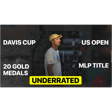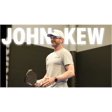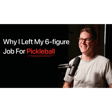Todd's Return to Apparel with Kitchen
00:00:08
Speaker
yet staying on the entrepreneurial path, Todd Weinberg has reemerged in the apparel space. Right now, the apparel market in Pickleball is a lot like taking a walk in the suburbs. You see a lot of the same stuff.
00:00:23
Speaker
But what happens when you start changing things up? You start taking a walk, say, downtown? Kitchen is an apparel brand that finds themselves as a niche within a niche within a niche, as the founder, Todd Weinberg, has described themselves. They're taking the chance by going the opposite direction, by trying to be the first of its kind. And while it's not abundantly clear yet whether or not it'll pay off, we still need brands like them
Impact of Dot-Com Crash on Todd's Career
00:00:47
Speaker
to take a chance. So I sat down with the founder, Todd Weinberg, as he opens up about his past endeavors what it's like to build a lifestyle brand and some key lessons he's learned along the way. And then one other big thing that happened was that the dot bomb or the crash that happened just a couple years after that where I essentially lost everything. This is the story of Todd Weinberg.
00:01:16
Speaker
Welcome to another episode of Building Pickleball.
Founding of Kitchen with Alex Plam
00:01:19
Speaker
Today is a founder series, and I'm joined by Todd Weinberg, who is a founder and CEO of Kitchen. He also, I will show the clips of them later, but his co-founder is here as well, Alex Plam. And Sam, what is where social media? Social media manager.
00:01:35
Speaker
this year as well. They actually just flew in from California. yeah um Thank you to my sponsors, Viore of course, and Peak Life. Tell me about the past couple weeks up until you had that one podcast that I used to listen to all the time, but like what your life has been like in the past like two, three weeks.
Reflections on Life and Kitchen's Challenges
00:01:54
Speaker
First of all, thank you for having me. I'm i'm a big fan. I think you're doing great work. and so Thank you for what you're doing in the pickleball community and the level of content, quality of content that you're putting out there. I think it's awesome. So not that my opinion really matters that much, but I think it's pretty cool. um Things have been amazing. um I'm really proud of what we've been building with with Kitchen.
Kitchen's Niche Strategy in Pickleball Apparel
00:02:17
Speaker
um I mean, we're we're jumping right into it, but like as many amazing things that are happening with the brand, there are, I'm just going to be very real, there's challenges. It's really hard to build a brand, especially a nichey sort of kind of like niche within a niche within a niche brand. And I can explain what I mean by that in ah in a sec. but to your point on the podcast ah that I was on last, it was essentially identified to me by one of the mentors in that podcast that I was in a very niche space, as if I didn't know that, but he kind of drove home how difficult it is to build a lifestyle brand within a niche environment.
00:02:58
Speaker
So I can get it more into that if you'd like, but yeah, go in man. We have plenty of time. Yeah. yeah So, um, yeah, i'm not exactly sure where to start, but I think where with this podcast, um, I was just excited to meet you number one and to of course have the exposure. But I think one of the things that got me excited about talking to you is,
00:03:24
Speaker
This gray hair came at a cost. I mean, I'm 55 years old now and I'm starting a new a company. We just launched Kitchen. so Kitchen is a pickleball-inspired lifestyle apparel brand.
Crossover Inspirations from Golf Brands
00:03:38
Speaker
So we are not particularly focused on on-court apparel. We are very much an off-court vibe. So we can talk more about that, but like some of the brands that inspired us i you know as we were developing Kitchen,
00:03:59
Speaker
We're in the golf space because I love golf and I love pickleball. And there are some brands that have broke the code, in my opinion, that have been able to transition in golf from on the course to Trader Joe's and date nights and and out to the movies and just lifestyle. And that appealed me to me and when I first came up with the idea of of of kitchen.
00:04:25
Speaker
um so Maybe in a moment we can talk about the origin story if you care to know that about how a Kitchen was started, but back to what this podcaster um mentor was saying to me was he is essentially saying that you have to have a lot of passion A lot of patience and I wish it started with a P, but a lot of money. It would just alliterate better if there was another P there. But um yeah, a lot of money to build a brand. And so I'm i'm a patient person and I have a lot of passion for pickleball, but I don't have an endless resources. And I think when I got down the road, so we've launched a year ago this November. So this basically around Thanksgiving will be our one year ah mark with the brand.
00:05:16
Speaker
And you know basically, I would say um when I told him that I ah didn't have unlimited resources, he didn't press on that. But essentially what he was saying is that you may have underestimated just how expensive this endeavor is going to be to build a brand.
Social Impact Model with Mobilize Love
00:05:38
Speaker
And so part of what got me excited about this podcast is maybe a bit of mentorship because i've I've started other businesses before, but this is by a factor of many. I think one of the hardest things I've ever done, um probably the hardest business I've ever tried to to create and get off the ground. Hope you're enjoying the video so far. I got to do a quick ad for my favorite sponsor, which is Viore. I've talked about them plenty of times, but we're in a new season so I can talk about new things. So first off, we have this one item, which if I saw it online, I probably wouldn't have bought it. I'm just one of those shoppers. Like I probably won't buy it. But if I got to try it in person and like feel it, wear it and see how comfortable it feels and how it fits my body.
00:06:25
Speaker
and how it actually looks on me personally, then I would probably buy it. And this is actually one of those items. So this is the Coronado Hapsip. This one comes in a few different colors. I, of course, love wearing gray. You've seen me wear gray in like all these videos. But Coronado Hapsip, super, super comfortable, super, super soft. It's just like the trademark Viore thing, right? Like super soft, good quality material. It just feels premium, which I love.
00:06:50
Speaker
so that I can wear this anywhere. I can wear it on the tennis court, pickleball court. I can wear it when I'm running. I can wear it when I'm hanging out at home, outside. If I go to a dinner with some friends, I can wear it to there. And I can feel very comfortable. I can feel like um I can just feel like confident that I'm wearing clothes that fits the occasion. So if you're looking for a gift for either yourself, maybe your partner, maybe a friend, maybe it's like your older brother or your dad, Viore does do free returns. So if they don't like it, they can return it.
00:07:19
Speaker
um There's free shipping on any orders of $75 or more, which for Viore is very easy to break that threshold. I mean, you just need to get like two items and you already get free shipping. So yeah, if you'd like 20% off your first order, you just go to viore.com slash building pickleball and you get 20% off your first purchase. They do free shipping on any orders of $75 or more and they do free returns as well.
Lifestyle vs. On-Court Apparel in Pickleball
00:07:44
Speaker
Sorry for talking so much.
00:07:45
Speaker
No, that's why we're here, man. Yeah. Yeah. It's better. You talk than I talk. People have heard me talk enough. And if I say like 10, at least 10 times throughout this, then someone's going to comment about it. But when you're talking about all of that, something that I found very interesting is when you made the distinction between lifestyle and on-court apparel, yeah because
00:08:08
Speaker
There's countless brands within pickleball right now. I think maybe the top one is probably paddles, which is like the most popular and apparel is becoming very popular. One of the first guests I had was Aubrey Steele, the founder of Chaville, awesome woman. yeah But even then that may have been all, may have been on the lifestyle route, but I still see what you guys are doing is definitely a little bit different. Right. How did you come to making the decision that you wanted to do lifestyle versus on court? That's a great question. Yeah. You know, when I first came up with the idea to do kitchen, um,
Evaluating Pickleball Apparel Market
00:08:46
Speaker
I had looked at the landscape of what's out there. And if you to go to any pickleball facility, um, indoor, outdoor, anywhere in the country, you're going to see that.
00:08:57
Speaker
for the most part, people don't care a whole lot about what they wear. I mean, it's a very, one of the things I love about pickleball, it's like a super chill sport, right? I mean, see people don't necessarily care. And so there's ah there's a really big distinction between what's a need to have and versus a nice to have in the sport. You need to have a paddle. You need to have a ball. You need to have a net. You know, there's so certain you need to have marked lines on the court.
00:09:23
Speaker
you don't need to have a teacher a certain Nike t-shirt or ad or whatever. So I started to look around and go, okay, gosh, there sure seems to be like a lot of Viore, there sure seems to be a lot of Lululemon, Wilson, Nike, all those like the big but brands are represented on the courts.
00:09:42
Speaker
And it's daunting when you start to go, okay, I want to compete against those guys. Like I want to have a pickleball t-shirt, you know, an active wear t-shirt. When you know that most people, it's like reinventing the wheel. Like i I'm personally going to wear like my Viore tee most likely, or my Lulu tee or whatever, when I play.
00:10:03
Speaker
And so I just thought there's a there's a bigger opportunity to and less noise in that side of the business. And so that's why I decided to go after the lifestyle side. And there are brands, like I was saying earlier, that have crossed over in in golf. ah So some of them, like um Travis Matthew is a good example, or Malvin, fantastic brand, Random Golf Club, Link Soul,
00:10:30
Speaker
um dero there's this a There's a bunch of them out there. And what I like like about them is that they are taken very seriously as as golf brands. But then, like I said, you could you can very easily buy some of their stuff and wear it like you know off the course, out on a date night or something. And if you as soon as you see that little Travis Matthew logo, if you're a golfer, you go, okay, that person's a golfer for sure, right? There's an identification. There's kind of like an inside thing going on.
00:11:00
Speaker
And that's kind of how I thought about kitchen is like Pickleball is so cool and fun that like if you really love it you want to identify with the brand like you want to identify with the sport when you're when you're out and about and that's what we wanted to create something that was subtle doesn't slap you outside the face like about pickleball, but it's a subtle nod to off-court ah Passion right for the game.
Subtle Branding and Community Building
00:11:25
Speaker
So like every time, i'm not every time, but many times when I'm out and about, you know, people will comment on like, is that a like a food thing? Or is that like, what is that? It's like ghost kitchen or something. Yeah, exactly. What is that exactly? So um yeah, we we have a lot of fun. It's like, if you know, you know. And I like that about the brand. If you know what a kitchen is in pickleball, then it's kind of a cool thing.
00:11:45
Speaker
That's cool. I mean, yeah it it kind of creates that, uh, like mutual, like affinity, if you will, that you could think like at one analogy would be sports teams. If you see someone in a jets or chief's Jersey, yeah you're like, go chiefs. Totally. And then if you see someone in pick walls, I'd be like, Oh, awesome. That person probably plays and the community is so like, so welcoming and nice. They aren't really like rivalries in the space yet. Maybe in the future there will be, but it's just not there. Yeah, I agree.
00:12:14
Speaker
Something you did mention was when you were looking at the landscape of the apparel side or even just in pickleball. So you saw what was existing. What else do you look for? Because you've done these, but you've created businesses before. What else do you look for when you're looking to start a business and what the existing landscape looks like? Like what makes you think that something is possible? Got it. Good question. Um,
00:12:42
Speaker
Well, one of the first things I look for is revenue streams, you know, because it's not rocket science. Like lots of people go out and try to sell a hat or a t-shirt or whatnot. And when you start to like other businesses that I've done in the past, there have been multiple like revenue opportunities. And what I'm, you know, learning very quickly is like you have this opportunity to create something. It's fun, like to create something out of nothing.
00:13:10
Speaker
and then actually bring it to market and all that's very exciting. But then the reality is somebody has to buy it. And so and and in this in this industry, you really have have one thing to sell. It's the brand and it's the it's the product you know and you hope that and you hope to develop ah a product and a brand that people really get excited about. So for me, it was like, what are the revenue opportunities? When you when I finally realized, okay, there's really one revenue opportunity right now. we We originally were looking, we have one of our um early releases was Saturday Paddle Club, this brand here. um Or this, this was like our first real launch around Saturday Paddle Club. And part of that was, um I don't love the name, the word pickle, if I'm honest. It's just kind of a weird thing to put in a sport. I like paddle, for you know, and I thought Saturday Paddle Club is kind of a cool, you know, vibe.
00:14:04
Speaker
And this actually did really well for us. And I think that we you know we tried to, to but we were thinking another revenue stream could be to create actual Saturday paddle clubs, like the clubs where you're a part of and you pay a membership due or something and you're part of a thing. And and and I think the other thing I realized about starting a brand ah is that it's really important to build community around the brand.
00:14:30
Speaker
it's like probably the most important thing, you know? And I don't know that I fully realized that going in. And um so ah if I could share one story, it's kind of a fun little little side note. So when I was earlier on getting going, and I mean, everything's early, because we've only existed for over a little over a year and have been out in the public for, since last November.
00:14:56
Speaker
But several months ago, I spoke with a mentor who happens to be the founder of a very successful um golf apparel brand. And he gave me a moment of time, which I really appreciated. And he said something that I felt was profound, which was when he started off, he wasn't thinking about starting a massive like successful golf brand. He was just thinking about building community around golf, because he loves golf. And so what he did is he started an Instagram account, and then he started posting everything that he thought was cool about golf. So whether it was golf courses, golf clothing, shoes, ah clubs, whatever, he just like anything that he thought was cool in golf. And then before you know it, like over a couple of years, he built like 30, I think it was over two or three years, he had over 30,000 followers that were just interested in hearing what he thought was cool ah about golf.
00:15:53
Speaker
And then one day he woke up and he's like, I wonder if these people will buy a hat for me kind of thing. And then he came up with a brand and he just like, he did not, what I'm saying is like, he built the community first. He knew that in order to be successful out the gate, it's more it's not like let's shove product down people's throats, it's let's build something special. And then once I have that kind of critical mass, so unfortunately I learned that in reverse. And I think most entrepreneurs do.
00:16:22
Speaker
ah There are so many people out there that i have amazing ideas. And I've talked to many that they'll have an, i and it's like, it's sexy and cool to think like, I've got this idea, I'm gonna take it to market. Then you get real about like what that actually means and what that costs. And it's a major dose of reality.
00:16:39
Speaker
but But I think if we would have like, we're just, we started with zero followers and we're almost a year in and we have 2,000 followers. So it it we're far away from 20,000 or 200,000 followers and it's gonna take a lot of time to get there. So I get all that, it's a very humbling experience.
Growth and Community Efforts
00:17:00
Speaker
But the other side of the coin is like, there's a reward, which is we built something and Every day somebody in the country is buying kitchen and that's tells us that we're onto something. Yeah. You've built the community before with having that shared that coworking space you've had, you know, the boutique brand you've invested in the tech space. So how are you personally trying to create community now with the current brand kitchen? yeah Everyone has their different ways, but I'm very curious to hear your way.
00:17:37
Speaker
Right. So this is why we're in Austin. you know Part of it is to primarily to to be with you. um But we also thought if we're going to come to Austin, we want to go do something to build community. So there's two there's there's a couple of things. So activations through events.
00:17:53
Speaker
And when you're a small team, we have a small team and we're trying to be at places and do what we can to get exposure. But that's like, there's nothing that beats that guerrilla warfare marketing where you're like out boots on the ground, getting in front of people, giving away free swag, talking to people, gauging what they like, what they don't like. I mean, so we're doing a lot of that and that's kind of textbook, right?
00:18:16
Speaker
um We also wanted to build community with a purpose and so to have, um and this is like what's what a lot of people don't know about Kitchen and I think we've struggled to get the word out, but we have a like a social impact element to the brand whereby we've partnered with an organization called Mobilize Love. They're based out of San Francisco, they're an amazing nonprofit organization that provides food and other important resources to the inner cities. um And so we, playing off the word kitchen, we thought it'd be kind of cool to do something with food and people who are underprivileged and needing ah meals. So we partnered with Mobilize Love and I got with the founder of that organization, Christian Wong.
00:19:04
Speaker
And we sat down and talked about like, okay, I need like with full integrity, I need to know what can I do to make an impact with this with this brand? How could we feed people while also selling pickleball gear? And he and I ah worked through the details and he basically said, you can say with integrity, if you give this percent this this amount per transaction away,
00:19:30
Speaker
um which it doesn't it's not necessarily important for me to disclose here, I don't think, but it's like we every transaction that um happens with Kitchen, we carve out a small percentage of that, to ah not a percentage, a dollar amount that goes to for one meal to a family in need. So every purchase does provide a meal ah to someone who desperately needs a meal.
00:19:55
Speaker
And so that's a social element that we have brought to the brand. And it's another way that we're trying to leverage that to to to build communities so that people understand kind of what undergirds what we think is important.
00:20:11
Speaker
That's awesome. I feel like you don't hear that that often. Well, so pickle you you don't. And I think, you know, back ah years ago, I had a brand I had, you mentioned alluded to, I had a boutique in my hometown. It was a men's and women's higher end clothing boutique and it was called Edge.
00:20:29
Speaker
And we we shut it we had it for 10 years, from 2006 to 2016. And um during that 10 year period, about three or four years in, my wife and I decided to give 100% of the proceeds away to charity. This was a something that had never been done in our area anyway. And my wife and I, were in ah we we were kind of in a place at that point in our lives where our livelihood was taken care of and we had enough.
00:20:58
Speaker
and we felt like any proceeds that were net profit from this endeavor should go to charity and we did that and what what was cool about that was I mean it was good while it was good but the community loved it and it and it actually became like known in town. Like if you shop at edge, you're doing actually some good because all the net profit profits are going to charity. Unfortunately with the economy and rents and everything, it was just really hard for me to to continue to make it after
Financial Aspects and Mature Business Perspective
00:21:32
Speaker
a certain amount of years. So after 10 years, we did we did close it down. But I wanted to take an element of that into kitchen and that's why it was important to us.
00:21:40
Speaker
yeah What's the feeling you get from that? You know, i I think I'm just at a stage in my life where it's, I want kitchen to succeed desperately. I really do. And I think, I think there's no reason why it shouldn't. And we're really proud of the brand and we're working every angle to make sure that it does. But at the end of the day, I'm at a stage in my life. I'm 55. I've kind of been there, done that. I've done a lot of things and I've thank, you know, I've had a lot of loss and I've had a lot of hardship. along the way but there's also been some wins and those wins have carried me to where I am today so that now today if kitchen fails I'm gonna be okay. I want kitchen to to succeed not because I want financial gain. I want financial gain for my team. I want them to have a meaningful outcome for sure. I mean highest priority but I also want to do some good with the brand. I want to have fun. um I don't want to do something that's not fun.
00:22:36
Speaker
So there's stress involved for sure, but I'm having a good time doing it and I want to kind of keep that keep that rolling. And yeah, so I think for me at this stage, I i just desperately, i so I don't um have feel like I have like a ton to prove anymore. In other words, i'm not my identity is not wrapped up in this.
00:23:00
Speaker
Again, I want it to do well. I'm i'm planning for it to do well. um But i don't want my when I was younger, I think that the things that I did for career, vocation, they were all tied up in identity. and And I think I've kind of moved beyond that now.
00:23:19
Speaker
dude that's awesome like you've reached a point that they usually always talk about in books or interviews of after this person has not necessarily made it but they've gotten older they've like hit the six like they've hit moments of success And it's cool to see that you haven't let things like greed over, like overtake your life.
Lessons from the Tech Boom and Wealth
00:23:43
Speaker
Like when they talk about the books and like some of the lessons that these people will reflect back on, they're like, well, I wish I had just given back more or done certain things with like maybe the, the things like the financial like gains that they had made. Yeah. So that's like, that's super cool. Um,
00:24:01
Speaker
The greed thing though is sneaky. How so? It's really sneaky. And this has nothing to do with pickleball, but it's I think important to talk about. Yeah. It's important to me anyway. And I think that um greed, I call it the green monster. It has a way of really like deceitfully getting the talents in you and me.
00:24:24
Speaker
and I struggled with greed for a long time and I have one little story about greed that really helped me. Back in the day after college I got into tech and I was in tech for about a dozen years and I worked for some small and large tech companies and I had the good fortune of being a part of a startup that got acquired.
00:24:48
Speaker
ultimately by Yahoo and I was only like 29, 28 years old and it yielded millions of dollars um in stock. And the stock this was back um in the kind of late 90s when the the tech boom was happening. This was before dot com? This was during the dot boom. Before the bust. Yeah, before the bust. And I was like riding that wave. and I was really fortunate to be a part of it. Me and some friends that were but we're working together on on a startup that got acquired.
00:25:21
Speaker
And I mean, I was young, married, little kids. I had little kids at the time and I didn't come from money. you know i I was squarely in the middle class. And all of a sudden, you know I am basically, I find myself with tons of stock options that were worth worth millions of dollars. And I didn't understand the value of a dollar, let alone millions of dollars.
00:25:45
Speaker
And I got way over my skis and I started to like look around it like there were literally people that were like receptionist level people making millions of dollars back in those days because it was just all about the stocks going Richter. And I remember um at one point um looking at the people around me and greed was kind of like controlling my my mind and my thoughts because I had enough.
00:26:12
Speaker
even at 28, nine years, i at that point, it was sort of enough. and But yet I kept looking around me and all these people that had more, that I knew had more. And I was like, well, I was afraid to sell because if I just hang on, maybe you know there's that old adage, how much is enough? Just a little bit more. It's like so true, right? And I remember one day,
00:26:34
Speaker
um My dad called me and my dad and I are very tight and he said, hey, can I take you out to lunch? And I was like an hour away and he was going to commute out to meet me at work. And I said, dad, we can just talk with the phone. You know, he goes, no, I really want to, I want to, it's important. I want to come. So he comes out, we have lunch and we're sitting in this restaurant at a two top in the middle of the restaurant.
00:26:56
Speaker
And I'll just never forget, he um he kind of says, son, you know, I love you, right? I'm like, of course. And you know, I have your best interests in mind, of course. um You've been blessed. He says, you know, you're young and you don't I don't think you realize like what you've got. And he takes the sugar trough that has all the sugar packets in it and he pours it all the sugars on the middle of the table, in the middle of the restaurant. And um I'm like, dad, what's up? What are you doing? And he kind of like pulls, makes a big pile in the center of the table. And he goes, these sugar packets represent all the blessing, like all of the stock that you...
00:27:39
Speaker
Didn't really deserve, you just right place, right time, and you've got these millions of dollars here. Do you see like how profound that is? I'm like, that's a, yeah, it's a big deal. And this is, you gotta remember, this is like when the stock market was literally going Richter. It just seemed like every day it was going up, up, up. And the company that I was connected to was doing amazing things. So I just assumed it was just gonna keep going up.
00:28:02
Speaker
And he basically puts his hand and he he makes two piles and he puts one pile, he keeps it in the middle and he pushes the other pile to me. He says, do me a favor. It's 12.15. The stock market closes at one o'clock in California.
00:28:19
Speaker
When we're done here, just call your broker. The stock's never been higher than it is today. Just call your broker, sell half, pay your taxes, put the rest in the bank, pay off your house, and enjoy your life. And if you wanna gamble with the other 50%, just let it ride. But please do something, and I could have.
00:28:38
Speaker
And I, it's embarrassing to talk about, but it's a huge lesson for me. Cause it's so humiliating. But I literally with so much arrogance as a young person back then was like, dad, you don't understand this company's just getting started. We are literally, we're going, we're going double from here. Like you don't get it. Cause I thought I understood and he was an old guy that just didn't get it. And now I'm his age.
00:29:03
Speaker
you know, what his what his age was or whatever thereabouts. And I'm looking back and and what happened was humiliating because it was shortly thereafter that the Dopp bomb basically happened. And rather than me sell, I just kind of kept my foot on the gas and I was just, I'm gonna ride this thing.
Resilience After Financial Loss
00:29:22
Speaker
And I saw this thing fall off a cliff several times and that my wealth evaporated.
00:29:28
Speaker
And it was horrible. It was just a horrible thing. And that was greed. So it was a long story to share, but it's meaningful because it it's helped give me new perspective around wealth and how it affects us. um I mean, it's biblical. It really is. It's like without going down that path, it's really true. You can't you can't love God and love money. This it's is too hard.
00:29:52
Speaker
um But anyway, that's another vein that we can go down. um But that was meaningful for me for sure. And for whatever reason, I went through like a desert period after that of like seven years where I had like to pick up the pieces and it was so humiliating and I almost had to like sell everything and move and all the things. But um By the grace of God, I was able to rebuild through another opportunity later and kind of get my life back on track. But it was crazy times. When you were 29 and you're in the office and everything was going up, yeah how did the greed and the wealth change how you treated other people or how you looked at the world?
00:30:36
Speaker
Yeah, you know, it's, it's again, kind of humiliating to talk about like, I don't, we just met and, and it's also like, I don't know how many people are going to see this, but it is, it's a little bit hard to talk about because I do feel like there was a, there was a Todd version 1.0 and a Todd version 2.0. And thankfully I think I've matured into 2.0, which is a better version of what I was.
00:31:00
Speaker
Um, I have another mentor friend of mine who talks about how we all have two pro we all have two identities. We have our LinkedIn identity and we have our real identity, like who we actually are. And what we give to the world is our LinkedIn identity. And like what, these are all of our accolades and accomplishments. And this is like what we want people to see about us. And, and our reality is like maybe different for some of us, definitely for me was. And I think, um, if I'm just honest, it's, is that.
00:31:32
Speaker
I was, my priorities got way out of whack. So like I was married at that at stage, i got I got married at like 24, 25. And so I was young married with a baby. And actually had my I had my daughter and my son was just born at that time, was just born.
00:31:51
Speaker
And I was caught up in the wealth because I had other friends that had private jets and had a had resource that was beyond, like I said, I was looking at other people around me that even more. And so I was just kind of like,
00:32:08
Speaker
Yeah, well it's Thursday afternoon, let's go skiing in Colorado, or let's let's go buy something fun and shiny, because ah because I can. And then what happens is you end up, you almost like you become separate from, like I became sort of separated from everything and every everyone that I really loved, because wealth can do that, it could separate.
00:32:29
Speaker
and i And I found that to be, and then and then it was like my marriage suffered. i I didn't, you know, like there were things, thankfully, I i was very faithful to my wife and all that. I didn't suffer in that way, but it was more like I just wasn't showing up the way that I know I should have. So yeah, i've i've I think losing it was the best thing that could have happened for me. It reset everything in me.
00:32:53
Speaker
Well, you're at an interesting point now because, um, you've had like a long career. You've been through so many like different companies and experiences. Where were you at when you first started kitchen? Hmm. Yeah.
Emotional Fulfillment and Birth of Kitchen
00:33:08
Speaker
Well, I was emotionally slipping, I would say. I was not well. And when I say that, not well, I physically was fine. um I have amazing things to be thankful for. But a year and a half ago, when i when before Kitchen existed, which is weird, so much has happened in a year and a half, but a year and a half ago,
00:33:28
Speaker
I was, when I say emotionally slipping, I was literally one day, I remember being um on holiday with my wife and I, she was kind of doing the work from work from home things that we were on holiday, but she was busy and it was this beautiful day and I wanted to, I had played golf and then I wanted to go play. I wanted to go for a hike or do something. It was enjoy the day and she was busy.
00:33:54
Speaker
So I remember kicking my feet up on the couch and grabbing my phone and like doom scrolling for like two hours. It was just... Facebook, Instagram, LinkedIn, whatever. And I'm like, and it's a beautiful day. And I'm like, oh my God, I'm like 54. And i'm I saw like my future and it was really dark. It's like this, I felt like I was waiting to die. Like this is how I'm gonna die. And I just like, that that's why I said, I finally like threw the phone down. I told my wife, I'm like, babe, I gotta figure something out. Because the thing is is that I've,
00:34:30
Speaker
it's ah it's ah It's almost like a catch 22. I was at a point in my life a year and a half ago where finally I had everything was kind of on cruise control. I sort of had everything dialed. Like I have this business back home, which is a shared workspace called The Den on School Street. It's a it's a shared, like ah like a boutique, we work sort of vibe.
00:34:50
Speaker
And it took us time to build it, but it's been eight years now. It's fully stabilized. It's full of tenants and it's doing great. And then I have a real estate development and management company. And that thankfully has is all dialed now and doing well. So literally my day, I would i would look at my phone and there'd be just big holes. So okay I can play golf and I can play pickleball, which is fun. But then what about the other like eight hours of the day?
00:35:15
Speaker
What am I going to do? And there were days where I would just be like, um, I'm kind of going crazy here. Like I got to figure this out. What do I do with all this time, you know, that I all of a sudden had. And I, I don't like to just be busy. You know, like I can tinker and garden and do things around the house and I've got like, I manage my properties. So I do things like that and I you know all those things but the truth is like I was really feeling like I needed I had one more thing in me I'm very like entrepreneurial always have been and I've done things that have failed I've done things that have succeeded and I was like I think I got one more thing in me and I told my wife that night I was like you know I gotta figure something out she's like yeah you do so I
00:36:00
Speaker
I said, I don't know what it's gonna be, but like let's keep our eyes open. know I'm gonna be thinking about something new to do. And I think we were both a little bit concerned about what that could look like, because I've done things in the past where when I when i decided to do something, I like go all in, and I'm like all in, and even, you know.
00:36:18
Speaker
Yeah, I can just kind of get sucked in. So I wanted to be careful and it was cool. How kitchen came about was a couple of weeks later, our kids who both lived down in SoCal, one in San Diego and one in Costa Mesa, they we wanted to do like a family trip. So we planned to go to um San Clemente and got like a little beach house, spent the weekend together. So we all kind of converged there. It was awesome. San Clemente is beautiful. It's super fun. So we were like,
00:36:48
Speaker
Let's go play pickleball. We all love pickleball. So as a family, that's something that we love to do. So we went to this park and it was like just going off. I mean, every court full, which is a thing, right? I mean, it's hard to find sometimes at least where we live. Courts are always full. So we're like sitting on this lawn with our paddles in the in the fence waiting to get on.
00:37:10
Speaker
And I'm just sitting around kind of looking and kind of observing. And I have a fashion background. I had edge boutique for many years, but then my parents were both in the fashion industry growing up. So I have a little bit of a kind of like, I'll look around and kind of just observe. And I was just looking at what people are wearing. And then I just thought, I wonder who owns the lifestyle side of pickleball?
00:37:33
Speaker
And while we're sitting there, I'm like doing a little bit of research and I literally couldn't find, the only thing I could really find was like, and I'm not gonna mention any names because it doesn't matter, but there were several companies that were like super cheesy, like a big pickle holding a paddle, right? Or like something like that. And I was like, man. Dink with me. Dink with me, yeah. And I was like, we could do better, people. So I just thought, you know what, I think I'm gonna start, I told my kids right there, I said, I think I'm gonna start a lifestyle apparel brand around pickleball.
Branding and Naming of 'Kitchen'
00:38:03
Speaker
start throwing out some names. Let's let's talk about it. like I need a good name. And um after they were like, dad, you're ridiculous. um I was like, no, like I'm serious. I think I want to do this. And um we so they start throwing out terms of pickleball terms. And as soon as my son said kitchen, I was like, hold on, wait. And I wrote it down on my, my sorry, i wrote it. I was using my iPhone. I wrote the word kitchen, K I T C H N.
00:38:29
Speaker
and then just decided to take the valves out and looked at it. And I was like, I think that's it. You know, I think that's a great, at least really strong brand name. And so of course, you know, you start like looking up yeah URLs and unfortunately somebody owns kitchen dot.com and they're like a Canadian.
00:38:44
Speaker
firm that has nothing to know but nothing do with, to do with pickleball and nothing to do with, um, like food, even, um, doesn't matter. i Just gave them a plug. But, uh, so we're shop kitchen shop, K T C H N.com. And then we are kitchen on social handles, but that's kind of a bummer. But anyway, kitchens is the name of the company and that's how we came up with it. And then it was like, literally, I was peddled to the metal at that point. It was just like,
00:39:11
Speaker
Do not walk, run and make this work. So we've got a trademark on the name and we got everything established on the operational front. And then I just started looking to build the brand.
00:39:22
Speaker
man, does that feeling ever go away of like the whole entrepreneurial, like I got one more in me. It's like, how do you know when to stay in one thing yeah and then when to end your time there and start something new? Yeah. Well, the first thought, it's a great question. The first thought that comes to mind is when the fun gets sucked out of it.
00:39:43
Speaker
because life's too short. I mean like obviously it's anything you do especially in this space is going to be hard. So I'm not saying it's not going to be. You can both can exist. It could be really hard and fun. So hard is like I think doing hard things is really important.
00:40:00
Speaker
um But if you start to wake up in the mornings, like, I'm just like, can't i that's not having fun anymore. This is draining the life out of me. I think that's a good time to look, you know, re-look. If it starts to feel like corporate world again, then... Yeah, or yeah, it's if it's just not a good kind of fit for you, I think it's... But yeah, so far I'm still having fun. And I've got an amazing team, which shout out um to my guys. um I love my team and I love what we've built. So, so far, still having fun. What do you think is the most and the most important first hire? Ooh.
00:40:46
Speaker
Well, first of all, before you figure that out, you got to I think it's important to to know what lane you are best suited for. like I think that a lot of entrepreneurs try to wear all the hats, and you have to to some extent.
00:41:02
Speaker
But when you start to get things going, it's really important to be like, man, I know what I'm good at. I know what I suck at. And to start like, what are the most important things that I suck at that need to get like, it's like the holes in the boat. You're not going to be able to fill them all right away. But where's the biggest hole in the boat?
00:41:21
Speaker
And so I think it's different for everybody because we all come with a different set of skills.
Strategic Hiring and Design Challenges
00:41:27
Speaker
I'm a starter, I'm a visionary, and I think I can see things, like how they're supposed to go, but I need a lot of like support when it comes to operational. I could do it, it's just not like I'm not the best with spreadsheets, I'm not the best like back office person. Not the best use of your time.
00:41:49
Speaker
It's not. so like that I immediately hired an accounting firm, for example, to make sure that all my books were handled properly. um and Then I needed Alex you know because I need somebody like Alex who I could just know is like on the journey with me and that has a different skill set. Like he brings different skills to the table, but like there's symbiotic, there's a symbiotic relationship there that it just feels good to to like lock arms with somebody when you're doing something big.
00:42:19
Speaker
And then from there, I started filling in with other aspects that were really important to the to the team. But yeah it's almost impossible to to get too far down the road at all to build a brand because there are so many facets involved. It's different than a lot of businesses that way. I mean, every business has lots of facets. But like with what I'm learning about this particular business and building an apparel brand,
00:42:43
Speaker
is there's it's it's it's it's so multifaceted that you need ah a pretty extensive team to do it right. What challenges are you experiencing right now versus when you started one year ago?
00:42:59
Speaker
Yeah, I think, you know, when you're starting off, it's like you got a handful of spaghetti and you throw it on the wall and you just kind of see what sticks. And the way what you weigh that kind of played out was we had a guy early on that came up with some graphical ideas that were not cheesy. We thought they were fine,
00:43:18
Speaker
But the reality is is they just weren't being received very well. So we had to, there were a few designs that did. And so we would just kind of like hone in. We went from like shotgun spraying bullets to sniper to like, what is it that actually people are are digging?
00:43:33
Speaker
And then once we kind of found that lane, we expanded on it. So for example, Saturday Paddle Club, which was our first real release, where we like narrowed our focus and built something around a vibe or like this Saturday Paddle Club. If you go to our website, you'll be able to see like all of the product that kind of fits within that category. And then our more recent launch was the retro revival stuff.
00:43:58
Speaker
Which I can show you here. yeah Pull them out. pull them this is our yeah This is our most popular selling hoodie right now. And it's again, it's it's pretty simple, but it's just clean. I don't know if that's going to show up well enough, but um it's just a really nice quality hoodie.
00:44:16
Speaker
um So that, and then- It's awesome. Something that you guys do really well is, well, I'm also just biased because I like minimal, but I think the colors and the minimal design, and even when it's not minimal design, well, I guess you could consider it still somewhat minimal with the King's card. Oh, right. Like that looks awesome. And it's still- You don't have that with me, but thank you. Yeah, like even that, even though it's like got more colors and a lot larger design, it still looks like minimal. It looks very, very clean.
00:44:46
Speaker
shout out to Bo Wallcheck for, uh, for that. He, uh, on our team created the king of the court and the queen of the court, which are awesome teas and have sold really well for us. This is part of our retro revival. Um, and what I love about this is it's again, it's kind of tells a little story, you know, I mean, it's like three characters kind of retro, you know, about to serve hitting the ball. And then like some, you can interpret that as he's frustrated. So he slams his racket on the ground. So many people come to mind when I see that last one. Exactly. Yeah. So I mean, it's fun. And then we, this is like, you know, we put that on a hat, um, because it's just different. And so what we're trying to do is just be a little bit different, you know, take some chances and do some things that people aren't, aren't doing in the space. Another is the Saturday battle club. Um, such a clean design.
00:45:37
Speaker
Things like this are what we're doing. And I think that the idea is to kind of be elevated and have really clean graphics and really high quality goods, but also be within reach. And so when you ask what's the challenge, it's like,
00:45:54
Speaker
I feel like we we could we're doing a good job of like coming up with really good clean elevated graphics that people are digging.
Material Sourcing and Niche Market Position
00:46:02
Speaker
It's the sourcing um you know it's it's it's sourcing materials and and blanks um in an economical way. Things are just so expensive these days. yeah So it's really hard to find margin in this business.
00:46:20
Speaker
unless you're buying very high quality and maybe even going overseas, which we haven't done yet. Oh, so you guys aren't overseas. So far, we're sourcing most of our stuff domestic. We are going overseas for a couple of items like this mug, Saturday Powder Club mug, or these soft I like those socks. Those socks are socks are fun. Yeah, they're great. They're, this is part of our retro revival and they're just, they're super comfortable, great socks. But for the most part, it's our biggest challenge is really like sourcing um right now and are getting our expenses down so that we can have more margin and the more margin we have, the bigger we can grow the company. One, two things there. One, pickleball, pickleball, the entire pickleball community loves a company or brand that sources within the United States. i Maybe it it could just be on the paddle side, but even then, when people hear this, they're going to be like, oh, that's awesome. We want to support a brand like that. yeah I guess the second is,
00:47:21
Speaker
and how are you overcoming that or how are you navigating that? We're trying to be patient. You know, like right now, like I said, unfortunately we didn't have the luxury of building a community first and then being able to sell to the community. And if you think about like starting from zero in a, so remember early on in the podcast, I said that we're a niche within a niche within a niche. What I mean by that is if you look at the opportunity that kitchen has compared to a brand that is a need to have brand,
00:47:50
Speaker
like a ah carbon or a Selkirk or a Hula or what what are these whatever these like paddle companies or whatever you got to have a good paddle if you want to take the sport seriously. we are so So pickleball is a niche within itself because it's a niche sport. thank Thankfully, it's a it's the fastest growing sport. So we're excited about that, but it's still like on the upswing. Then within that niche, we're not active where we're we're lifestyle. And then within lifestyle, we're a certain age demographic.
00:48:23
Speaker
at least like all ages wear our stuff but like we're really like in that 22 to 38 sort of age range where people really are love us and then it's kind of like if the cool thing cool kids think we're cool then the older people will wear it but but that's our demo. So like we're nichey. And so the answer is we're going to hopefully get there in time. We have to build critical mass. And so I can't buy big quantities. I can't i can't go out and buy 500 to a thousand units of.
00:48:56
Speaker
this at right now, we're just not quite there yet. But the idea is that once we get there, my margins will get better and we'll be able to you know grow
Patient Growth in Pickleball Market
00:49:05
Speaker
from there. but So it's it's ah it's a patience and passion project. i dont mean I didn't even ask this, why do you guys source domestically?
00:49:16
Speaker
Well, it's just much easier, especially like to be nimble. Like if I'm dealing with with overseas, whether it's China or or Pakistan or wherever, they the the time to get product samples back and forth and approved, and then the minimum quantities that are typically required to get started it's people don't realize like you you would ah you would think that you just go straight overseas to to do this but the truth is like I believe that it's important to figure out who you are and how like who your audience is and we're in that phase where we're like I said we're we're coming up on a year so we're so we're still learning this but we're we're honing in on who we are
00:50:07
Speaker
So the reason we haven't done that yet, and I'd love to stay domestic if we can find a partner or two that are are going to help us like with our margins. um But yeah that's that would be amazing. um But that's why we haven't yet.
00:50:25
Speaker
You've worked at ah you've worked like within tech companies, and tech companies are usually somewhat like always forward-thinking.
00:50:33
Speaker
thing about this type of apparel, and I wish it was more of this is that the market isn't really, I don't think they've seen it. They're not really used to it. And this could always go back to the old, like Steve Jobs saying was like the whole, and like Henry Ford analogy is like, if you asked, if you told, if you ask people what they wanted and he gave them that, then it would be a very poor outcome. Yeah. Like How do you, how do you think about that? Like the way the brand is, it's like there's no other brands putting out this type of de set design, this aesthetic, the quality, like people are just comfortable wearing but yeah ah gil a% gilden shirt or a next level tee or things like that. They don't, the market hasn't really quite cared about the quality yet, yeah which I wish it wasn't like that. right Like how do you navigate thinking? It is, it is like, it's tricky. Um,
00:51:30
Speaker
because I agree with you. And one of my earlier mentors mentors said that you should take, if you're gonna do this, you should take some risks. You should do things that are not that people are not doing, whether that's with regard to quality. So you gotta push your pricing up just a little bit because you're go to you the idea was never sell anything, sell anything to anyone that I wouldn't wanna be stoked to wear myself.
00:51:54
Speaker
right I think that's very really important. And so the idea would be like, I really want to be careful not to just come up with designs that are going to satisfy like a certain pickleball, I don't know, like look and feel like a pickle holding a paddle to use a crude analogy. The idea was take some risks, do some things that are out of the box, you know? So this whole retro revival idea, like who's doing this?
00:52:23
Speaker
like its The idea is, it's almost like, what is that? And we it's and the thing is, like you could you figure out what it is. you I mean, it's up to the customer. And so weird' we're wanting to do some things, like like you said. I think the easy the path of least resistance is to come up with the pickle in a paddle.
00:52:45
Speaker
And maybe that's what we should have done, but that's, I can't do it. I don't, that's not me. So we're either going to succeed doing stuff like this, which I think is very cool. And there's a market for it or we're not. And it means that we're either too early, um, and the market hasn't caught up yet, or maybe we're just missing the mark. Yeah. That's what I was kind of getting at. It's like, what do you do when you're too early? yeah Yeah, it's, it's something that has come up recently actually. And it's, it's a, it's a concern. Um,
00:53:16
Speaker
So there's benefits and detriments to being early. I think the benefit is that you get to stake a claim and say like, we were here first, you know, pickleball a year, even a year ago, I thought I was kind of late to the game, but I was looking at the landscape and I was like, wait, there's really not that many like lifestyle brands out here. So.
00:53:33
Speaker
In my opinion, I think we're so we' very early and there's plenty of room to grow. So being early is has a benefit because you could say like you can start getting some early brand recognition. The detriment to being early is that kind of goes back to what that last mentor of mine said, which is you just got to have a lot of patience and passion and money because it may end up being like a long tail towards success,
Pros and Cons in a Growing Market
00:54:00
Speaker
right? Because if you're too early, that means this thing has to catch up to, you know, like kitchen has to sort of like catch up to where the market's going to be.
00:54:08
Speaker
And so being a niche within a niche within a niche is because we are early, we're ah getting more like early gold rush days. So it's a matter of like fortitude like, do we have the fortitude and the patience and the and the resources?
00:54:23
Speaker
um And I think there's gonna, I mean, this is probably oversharing, but I think there's gonna be a lot of consolidation in the space because it's like any industry that's like burgeoning and growing from the from the ground up that you see a lot of you know consolidation and then you see the big certain players like just went out, like whatever happened to AOL, right? They were early or what was it, MySpace, you know? These guys were like early to the game, but then the 800 pound gorillas just like overtook them.
00:54:51
Speaker
You know, and so I don't know, maybe at some point, Viore or Lulu or one of these, like what I would consider 800 pound gorillas in the lifestyle space might just kind of like say, you know what, we're going to take over, you know? And I mean, the dream would be like to be absorbed by one of those companies and to have that infrastructure and resource. But that'd be really fun. But we're just not there yet. So.
00:55:15
Speaker
I guess when you're early, you do get like the first movers advantage and also be associated heavily, heavily associated with being that thing. Yeah, exactly. This is somewhat similar along the same vein. Have you guys experienced yet of people taking y'alls designs and selling it on Etsy or eBay?
00:55:36
Speaker
No, not yet. Maybe that's a problem because I know that, you know, uh, imitation is a form of flattery. Uh, that hasn't happened yet though, but we are still so young. It's the definitely a popular thing. I know even Chris Olsen, his three five at best shirt is now sold on Amazon and all these other. Yeah. I did not know that.
00:55:59
Speaker
I haven't mentioned Chris on this podcast in a while. He's going to be very flattered. That's awesome. Um, it's always interesting. Oh, what's that?
00:56:12
Speaker
Oh, somebody. Wow. Okay. Okay. So no one can really see this, but Alex just pulled up. Someone copied on Google, a quick Google search and someone has the dink around and find out. I stand corrected. Dink around and find out was one of our best selling shirts. We sold through like three rounds. Oh, really? of That shirt. had ah It was great for us. I think to this day, right? Our best-selling shirt. ah dink around and We still have, and we had it on a hat. I don't have it with me right now, but on our website, I think we still have some in inventory. But yeah, I mean, that was our thing. um And so I guess somebody did take that. That's funny. And that's going to be an interesting, like you can't really do anything about it, especially if they're overseas. and ah Yeah. I mean, I think the only thing I would do is like, if somebody tried to use our name, then, then I would have to, you know, pursue that. But, you know, well, otherwise there's probably going to be other Saturday paddle clubs out there, but we had the corner on it. Yeah.
00:57:08
Speaker
What were you like when you were 18 years old? Oh, man. Brian. Brian. Oh, geez. um What was I like?
00:57:21
Speaker
um I was very driven, you know, I think growing up in a home where ah there was a lot of emphasis early on any way of like making money and like having what money was important. And so I think I had and then have an unhealthy relationship with money at an early age. um And so there was a there was sort of this like kind of like I don't know, early aspirations to be entrepreneurial. And I saw like my father was in always in sales, never had a, he was always a commission guy. and And what I learned about that is nobody can put a ceiling on your earnings. You can go and sell as much as you can sell and make as much as you want to make. It's just going to require more selling.
00:58:13
Speaker
The unhealthy side of that, of course, is that if you don't have an off button, you could be like constantly working. And that could be at the detriment of a marriage, like it was in my family's case, not me personally, but in my family's case. And so I didn't want to go down that route, but I think I had to, um I think I was just a very driven young person.
Personal Reflections on Money and Relationships
00:58:34
Speaker
You know, I also got married pretty young. And so like a very, very like,
00:58:39
Speaker
very compelled to be a good provider from a young age and be highly, maybe first born also. I'm a first born, so I was like, there's a higher level, traditionally like higher level of responsibility. I think I fall into that.
00:58:54
Speaker
That was pretty standard back then too, though. Yeah, I think so. say that no that's That's fine. But it was like you get married young, you become like a company man or a company guy. And then yeah it was more a little bit more predictable structure, but that's how like everyone was kind of living that. Totally.
00:59:10
Speaker
Yeah, and there wasn't a lot of emphasis back then on like, just do what's fun. Like it was more like, just go get a job and go make money. It's like necessity back then. There's like wars going on back then. Did your parents get divorced? They did, yeah. Divorce parents' club. Let's go. Yay. Oh.
00:59:33
Speaker
What kind of impact does your parents have individually on your upbringing and how you turned out to where you are like now? Yeah, I'm amazing parents. You know, they had a really difficult marriage and that's their story. So I'm not going to go down that road, um but you know ah wasn't um it wasn't a rosy upbringing. um However, there was a lot of love. So I'm very fortunate because I never felt like my parents didn't love me or support me. There was a ton of that. It was just more turmoil between them. And so as a kid, young kid, growing up in a home like that, it does leave a mark. um i I have one sister, younger sister, and so, um
01:00:18
Speaker
You know, if I'm honest, I think there was a part of me at a young age, it was like realizing when I was let's say 15, 17, 19 in that range, where I was like, okay, I want to find a woman that I can spend my life with and do marriage. like the opposite of what I saw and do it the right way, whatever. And I'm, you know, thankfully I'm 30, I'm going on 31 years married now and very happy. I'm probably happier now than I've ever been in my marriage, which is amazing. And I'm so thankful for for that. um But it's, it's been a lot of work, you know? But we have a, we have a great marriage and that's my biggest blessing, that and my kids.
01:01:02
Speaker
When you're an entrepreneur and you have entrepreneurial soul, what would be the one thing that comes to mind as far as how to have a successful marriage while you're also, your mind is constantly probably in business and just like always like foot on the gas. Hmm. Such a good question. Such a good one. Yeah, man.
01:01:28
Speaker
I'm just thinking about, sadly, some of the people that I know in my life that are going through really difficult marital struggles right now. And um everybody has a different origin story and everybody has a different story as to why things are not going well. But what I see quite often is a ah a growing apathy in the marriage where it's like,
01:01:57
Speaker
the busyness of life and the distractions and all of the anxieties that life brings, and there's plenty, um creates this sort of like shell. And so you get like two people that have that are really well-intended that want to have a life, a good life together that are overwhelmed by life. And so there they they they become apathetic.
01:02:23
Speaker
in the relationship and they no longer do date nights. They no longer take little spontaneous spontaneous trips and they don't pour into the relationship. I've always thought it's a miracle that you can take two different people from completely different like origins of and put them together at a young age and be like, okay, go spend 60 years together. Go do it. You'll figure it out. like How does that even happen? It's like a miracle when people stay together that long.
01:02:48
Speaker
and um But it it but takes a lot of work and it takes a lot of commitment. And I think today we live in an age where sadly, like it's a very like kind of, I don't know, disposable mentality. like If it doesn't work, it's what this well we'll divorce and figure it out with another, someone else. It's not like a we're gonna go through the trenches together and we're gonna make this work no matter what. So yeah, there's some of that. What are you currently learning about
01:03:19
Speaker
What am I currently learning?
Combating Loneliness and Community Building
01:03:23
Speaker
That's a good one.
01:03:26
Speaker
Well, ah of something that somebody mentioned to me recently, who he's writing a book about loneliness and he said,
01:03:40
Speaker
Loneliness is ah a major epidemic right now. um And the effects of loneliness are as toxic as like smoking, he said. and he And I was asking him to unpack that and he said that because of our devices,
01:03:59
Speaker
and all the screen time, we've become very inward people and we've lost, we we we through social media, we feel like we're connected, but it's very artificial. There's not a lot of this happening, where you're sitting across from somebody and like really engaging, especially like the unsafe. In other words, it it's one thing to be safe. Like I'm with my mom, my dad, my sister, my closest friend. It's another thing to put yourself in an environment like,
01:04:29
Speaker
like to ask a girl out or to ask, you know, like for a guy to like literally walk up to a girl and actually ask her out. My son and I have had conversations about this. Like so much happens behind a screen nowadays or through apps that it's like, we've lost some of that art, you know? And I think that loneliness is the thing that I'm learning about. And that's what I love so much about pickleball to bring it back is it's kind of the perfect sport. It's like,
01:04:57
Speaker
What is this sport that just brings people together? It's crazy, you know? It's like there's something about pickleball that creates community and connection like I've never seen before. And I think that's why I get so hyped about it. yeah You know? So, loneliness. A great way to meet people, whether it's for business, friendship, love. Yeah, it breaks the loneliness code for sure if you put yourself out there. Yeah. How did you how did you get started in pickleball?
01:05:26
Speaker
Uh, my kids, yeah, my kids were totally into pickleball and which is funny cause it's like, you know, ah from what I understand the the age of the sport is skewing much lower, like monthly, right? But I think even a couple of years ago it was like for older guys like me, but now I'm hearing like junior high and high schools have pickleball PE classes and they're starting to recruit kids out of high school to play, right?
01:05:50
Speaker
Yeah, I think so. And they're like, these kids are, it's become a cool thing. It's the cool thing. I love that. So yeah, it's my kids got me into it. What level are you? Come on. I guess i don't know. I don't know what level I am. I'm like working too hard to play too much pickleball. So I get by, let's put it that way. You and I are not going to be playing pickleball together. Let's just say trying to create a founderss founder's founder series. Oh wow. I gotta help my game for sure. Yeah.
01:06:18
Speaker
Hey, thank you for having me, by the way. This has been, it's been great. I know I've been spending a lot of your time, but probably spider webbed a lot, but. No, this is awesome. This goes back to exactly what you're saying about like the phone life versus like in person. Yeah. I used to do a lot of online interviews and conversations just felt so weird. And I couldn't think of commerce. Like I couldn't think of stuff in the moment. yeah It just doesn't flow as nicely. Right. And I don't know. I'll always like remember these conversations. Like the moment I saw you guys like at the door, there's like two massive bags. I look like there's dead bodies in it. Yeah. And, uh, it's cool. Like it's, we've been working at this for, I don't know, like a month. yeah Yeah. Oh, that's right. The events, the podcast, um, which has been great. Yeah. Yeah. This is so cool. It's a super cool experience. Um, what's the best advice you've ever received?
01:07:20
Speaker
Two things come to mind. Best advice I've ever received. um Somebody early on told me that debt is a four little four-letter word, D-E-P-T, debt. Debt is a four-letter word. And for some reason that like always stuck with me. like i' I've learned that um I never want to be buried by my debt. And so I've always tried to the best I can, especially as a married person, like live within our means, which is always is tricky, you know, sometimes. And there were times where I had built up debt and I felt suffocated by the debt. um And so that's part of what's really daunting about building a business is like a business, like an apparel brand. It's very expensive and I'm bankrolling this by myself right now. So.
01:08:14
Speaker
um Staying out of debt is one bit of advice that I've tried to adhere to. Another thing, a ah bit of advice is somebody told me um to do hard things years ago, like don't stop doing hard things. And I think that it's not only good advice, I think it's imperative. I literally think that like, I remember like, so I'm 55 when I was 52. You're 55. I'm 55, yeah. And one of my friends, um when I was 52 asked me if I'd run a marathon with him.
01:08:46
Speaker
And maybe I told you the story because you're you're a runner, I know, um you inspire me. But I don't run like I used to, but I had never run more than three or four miles and he wanted me to run a marathon. And I'm like, dude, that's your, yeah, I know. Like, come on. He's like, I really want to run a marathon, you know? And I'm like, that's your dream, bro. That's not mine. um But he wanted to run with me. But anyway, long story short is I thought, well, that's a really hard thing. Like, that's not easy to do.
01:09:13
Speaker
But I'm gonna do it because it's hard, you know, and I'm gonna put my mind to it and it's like um We talked about I think when when we first met about David Goggins. Oh, yeah, his book is both his books are right there. Okay. Yeah, so obviously Obviously, but I've never met him but I've read his books and I've when I was training for the marathon He was an inspiration for me. Oh you can yeah, you'll get up for every run if you're reading his book like in parallel with training Oh, yeah Yeah, but his thesis about like most of us will live our lives and die having only ever achieved about 40% of our potential, which means we have 60% reserves in the tank that we never tap into, most of us.
Philosophy of Doing Hard Things
01:09:57
Speaker
And I was like, I'm not gonna be that guy.
01:09:59
Speaker
Like I want to, I want to dig deeper. And so like, there's just something about doing hard things. So if anyone out there in your audience wants to, for example, build a apparel brand, I would say call me. Um, cause that's a hard thing and we could talk about whether it makes sense to go do that. Um, cause I've learned a lot. What are the hard things are you doing now? Um,
01:10:22
Speaker
So I don't know that I have a ton of capacity to do much harder than what I'm doing right now. What I'm doing right now is really hard. And between on the on the vocational front, on the personal front, what I'm dealing with that's really hard is there are several family members that are going through like life-threatening things right now that my wife and I are trying to tend to and be a support for. And so those are really I'm at that stage in my life where some of that stuff's coming up.
01:10:52
Speaker
um And that's kind of a weird circle of life thing. When you start going, wow, like the people that I love that are like closest to me are getting older and breaking down and I have to, you know, I have to, I get to be there for them. And what does that look like? That's hard right now that I'm going through. That stuff's tough. stuff
01:11:18
Speaker
I've been, I feel like I've been saying this a lot, but you've had such an extensive career where you've had a lot of really big experiences, but what would you say is like your most proud moment or like proud accomplishment?
01:11:35
Speaker
So there's been several like big moments that were both great and and hard, right? So like I mentioned earlier, there was a this um this startup that got acquired that was like as a young person, that was like a really great quote unquote accomplishment for our company. And then one other big thing that happened was the tech the dot bomb or the crash that happened just a couple of years after that, where I essentially lost everything. And that was a big memorable moment. And then when I was able to be, um I think you mentioned in my profile, but I was a part of a venture firm that was a early investor in Baidu, which is the china the the Google of China. And we were one of the original investors in that company that was helpful in providing some financial
01:12:25
Speaker
um freedom for us um at some point. so So those were like big tectonic like life events or vocational things that happened that i'm that I'm really proud of that even the hard stuff that I went through that I'm proud of. What I'm most proud of recently is that we actually set out to do something with kitchen and are doing it because it's like I said it and I have said it so many times, it was hard. And so like the fact that we that we came we decided to build a brand and we actually have people every day buying kitchen. um that's That feels like a win. I don't know where it's gonna go from here, but that was an accomplishment that I'm proud of.
01:13:06
Speaker
what's next for kitchen
01:13:15
Speaker
I think going into next year, it may be interesting to find a capital partner at this. I think I might be at that stage where it'd be nice to partner with somebody. um Ideally, it would be... um either great to do that where I can infuse some strategic capital into the company that would allow us to blow up our marketing bigger than what we've done thus far, um or to find ah a brand that is established in the pickleball space or adjacent to the space.
01:13:54
Speaker
that might want to collab with us or even where we could tuck into ah that brand. Because like I said, I think consolidation, I think people are afraid to talk about it, but I think it's just going to happen in this space. there's Brands are gonna fall off.
01:14:09
Speaker
our brands are gonna get absorbed. You see it in the paddle space already. It's happening, right? So I think it's gonna happen in my space as well. So i'm I'm not afraid to have those conversations. I feel like we've built something meaningful and I don't wanna see it die. I wanna see it grow. Consolidation is just, it's a given, it's gonna happen in the space. So I think that next year is going to be exciting and very telling for a lot of brands.
01:14:38
Speaker
There are brands out there that are still coming online. um and And I'm seeing them here or there. There are brands that have fallen off. And then there are brands that are question marks in my mind, not to name any brands, but like you see the brands out there and you go, huh, I wonder like who's behind the brand? like What kind of money is behind the brand? Because I think i maybe I'm too close to understanding like what what's involved.
01:15:04
Speaker
So it's just going to be interesting to see how things play out. But I'm for collab. i I think that there's room for plenty and like great minds should come together and there should be cooperative efforts for everyone to succeed. If someone was interested in the collaboration or the capital aspect, what's the best way for them to reach out to you?
01:15:28
Speaker
Uh, um, I can be very easily reached at, um, my, my email taught at shop kitchen.com. Um, or through my LinkedIn profile. Do you think pickleball is considered a real sport versus a game or a hobby?
01:15:45
Speaker
Yeah, I do. I do now. I mean, I literally did not understand this sport. Like at first I was like, what is going on here? But now that, you know, all of my reels are like pickleball reels. And you start to see the work and the talent and the finesse um and the strategy that goes into the game. And I'm like, dang, this is for sure. A real sport should be definitely in the Olympics.
01:16:11
Speaker
So um I'm not just saying that because I have this company. I truly believe that it's ah it's a great sport. I just don't love the name. Do you think the name should be changed? It should be paddle. It should be paddle ball. Paddle ball? Yeah. Well, I know there's, there's Padel, right? There's that sport, right? And it's very popular, especially in Europe, but I think it should be paddle ball.
01:16:35
Speaker
Beau, who cares what I think? but I'm just an old guy that thinks it should be something that it will never be. Do you think the hate from tennis players is warranted is what Sam asked?
01:16:52
Speaker
I mean, i sure. I mean, I could see how tennis players would hate it. I can also see how homeowners would hate it if they live close to court. I would never want to live next to a court. Yeah. Absolutely not. That'd be rough. So yeah. I don't know if that's a hot take, but that's definitely yeah data. Do you watch pro pickleball? I do from time to time. Yeah. I'm not, I'm not ah super versed in like all of the players and all the rankings and such, but, uh,
01:17:21
Speaker
Thank you. Like thank you for coming out here. It's mean always means so much when people come out and they come to Austin to travel here and you brought your whole crew. Well, not the whole crew, but you bought like three. There's three of y'all here. And especially during a weekend like F1 and the Texas Georgia games happening. Yeah. And the partnership for the event. It's like super cool idea to run by.
01:17:50
Speaker
there was a moment in the podcast




















